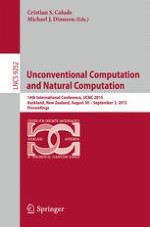2015 | OriginalPaper | Buchkapitel
Non-cooperative Algorithms in Self-assembly
verfasst von : Pierre-Étienne Meunier
Erschienen in: Unconventional Computation and Natural Computation
Aktivieren Sie unsere intelligente Suche, um passende Fachinhalte oder Patente zu finden.
Wählen Sie Textabschnitte aus um mit Künstlicher Intelligenz passenden Patente zu finden. powered by
Markieren Sie Textabschnitte, um KI-gestützt weitere passende Inhalte zu finden. powered by
